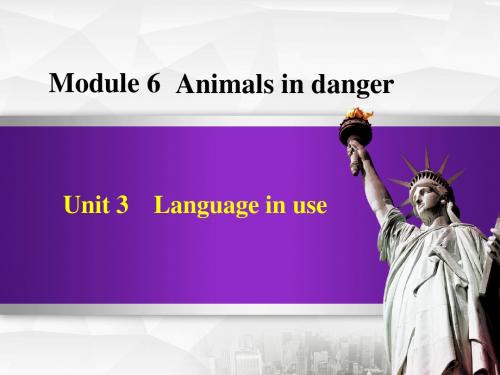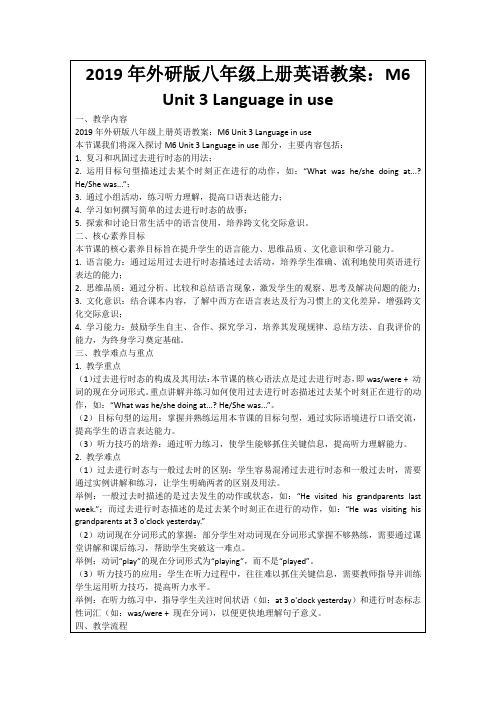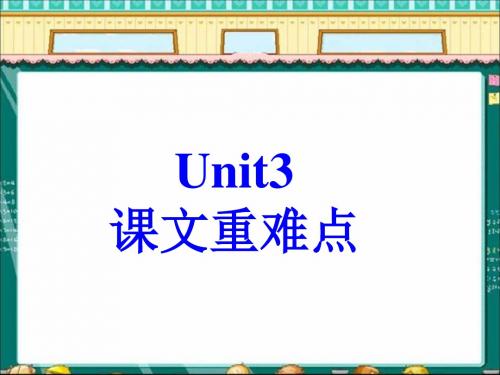初二上M6-Unit3——外研版
合集下载
八年级英语上学期module 6 unit 3外研英语

. What happened
.What happened next .What happened finally
hit the bag
4
I didn’t go to bed until my father came back.
The man lay on the road.
luckily adv. 幸运地
he was not badly hurt. He was very lucky.
lie on the road
They were going round the corner and stopping the traffic.
What were Li Lei and Jim doing? They were carrying the man to the school gatekeeper’s room.
Good luck!
What was the man doing?
He was driving a motorbike.
What were the children doing?
They were shouting to the driver.
What were the girls doing
Module 6 A famous story
Unit 4Βιβλιοθήκη past continuous
Module task
教材分析: Around the world 教学目标:Module task make a short story about their past experience
教学重点和难点: make a short story about their past experience
外研版八年级英语上册 M6 Unit 3【精品课件】

B. to stop D. stopped
【点拨】tell sb.to do sth.固定用法,“告诉某人做某事”。
考向二 动词(+宾语)+疑问词+不定式 加疑问词后再加不定式的动词: decide,know,forget,learn,remember,show, wonder,explain,tell... eg:Please show us how to do that. 请演示给我们如何去做。
1
Match the two parts of the sentences.
1 They let the elephants... 2 We want the animals... 3 We should not allow the
situation... 4 Help us... 5 They came here...
I went to the nature park to see the wild animals. 2 They asked the children...
They asked the children not to feed the animals in the zoo. 3 Let's help them...
tell you A to the Bird Island.(四川资阳)
A. how to get
B. what to get
C. whom to get
D. where to get
【点拨】含特殊疑问词的不定式。句意为“孩子们,请注 意了。现在让我告诉你们怎样去鸟岛。”how,what, whom,where分别对“方式,事物,人物和地点”提问, 由句意知选A。
Let's help them grow more bamboo for pandas to eat. 4 We want...
外研社 八年级上册 《Module 6—unit3》课件

Daming: It’s about animals in danger, and
what the government is doing (3)
c
____.
Tony: Oh, I’d like to see it. I’m doing my
homework about that. What time (4)
A. to eat B. eating C. lived D. living 5. His mother asks himB______ hard.
A. study B. to study C. studies D. studying
1. The woman made his sonC_____ finally after she told him some jokes. (2010吉林通
化)
A. laughed B. to laugh C. laugh D. laughing
2. - What would you like for breakfast?
- I like hamburgers. But now I’d like _B______ some cakes. (2010湖北黄石)
on earth.
in danger in order to in peace in the wild
1. Animals in many places around the world are
in danger
_________.
2. We can help animals to live safely i_n_t_h_e__w_i_ld__.
the wild.
1. Nowadays so many animalBs ___ danger, we should take actions to save them.
外研版八上册Module6Unit3教学课件

Suppose(假设)you were this animal, please call on (呼吁)people to save you.
We are … in danger.
• What animal do you want to help? • Where do you live? • What do you feed on? • Why are you in danger? • How difficult is the situation? • What do you want to say to people?
• 2. Don’t make these lovely animals only appear in books and photos in the near future.
• 3. There is a long way to go to save them,but nothing is impossible if we try.
in danger The bamboo forests are
getting smaller, so …
losing their home.
help baby pandas live; set up nature parks Choose..be symbol Work hard
Only about one hundred and few live in the wild
……Blue whales, W…ild…Bactrian camels.
protect their home in the wild; stop people killing tigers ……
Choose an animal you are going to help.
2019年外研版八年级上册英语教案:M6Unit3Languageinuse

3.成果分享:每个小组将选择一名代表来分享他们的讨论成果。这些成果将被记录在黑板上或投影仪上,以便全班都能看到。
(五)总结回顾(用时5分钟)
今天的学习,我们了解了过去进行时态的基本概念、重要性和应用。同时,我们也通过实践活动和小组讨论加深了对过去进行时态的理解。我希望大家能够掌握这些知识点,并在日常生活中灵活运用。最后,如果有任何疑问或不明白的地方,请随时向我提问。
本节课的核心素养目标旨在提升学生的语言能力、思维品质、文化意识和学习能力。
1.语言能力:通过运用过去进行时态描述过去活动,培养学生准确、流利地使用英语进行表达的能力;
2.思维品质:通过分析、比较和总结语言现象,激发学生的观察、思考及解决问题的能力;
3.文化意识:结合课本内容,了解中西方在语言表达及行为习惯上的文化差异,增强跨文化交际意识;
(2)目标句型的运用:掌握并熟练运用本节课的目标句型,通过实际语境进行口语交流,提高学生的语言表达能力。
(3)听力技巧的培养:通过听力练习,使学生能够抓住关键信息,提高听力理解能力。
2.教学难点
(1)过去进行时态与一般过去时的区别:学生容易混淆过去进行时态和一般过去时,需要通过实例讲解和练习,让学生明确两者的区别及用法。
4.学习能力:鼓励学生自主、合作、探究学习,培养其发现规律、总结方法、自我评价的能力,为终身学习奠定基础。
三、教学难点与重点
1.教学重点
(1)过去进行时态的构成及其用法:本节课的核心语法点是过去进行时态,即was/were +动词的现在分词形式。重点讲解并练习如何使用过去进行时态描述过去某个时刻正在进行的动作,如:“What was he/she doing at...? He/She was...”。
3.成果展示:每个小组将向全班展示他们的讨论成果和角色扮演活动。
(五)总结回顾(用时5分钟)
今天的学习,我们了解了过去进行时态的基本概念、重要性和应用。同时,我们也通过实践活动和小组讨论加深了对过去进行时态的理解。我希望大家能够掌握这些知识点,并在日常生活中灵活运用。最后,如果有任何疑问或不明白的地方,请随时向我提问。
本节课的核心素养目标旨在提升学生的语言能力、思维品质、文化意识和学习能力。
1.语言能力:通过运用过去进行时态描述过去活动,培养学生准确、流利地使用英语进行表达的能力;
2.思维品质:通过分析、比较和总结语言现象,激发学生的观察、思考及解决问题的能力;
3.文化意识:结合课本内容,了解中西方在语言表达及行为习惯上的文化差异,增强跨文化交际意识;
(2)目标句型的运用:掌握并熟练运用本节课的目标句型,通过实际语境进行口语交流,提高学生的语言表达能力。
(3)听力技巧的培养:通过听力练习,使学生能够抓住关键信息,提高听力理解能力。
2.教学难点
(1)过去进行时态与一般过去时的区别:学生容易混淆过去进行时态和一般过去时,需要通过实例讲解和练习,让学生明确两者的区别及用法。
4.学习能力:鼓励学生自主、合作、探究学习,培养其发现规律、总结方法、自我评价的能力,为终身学习奠定基础。
三、教学难点与重点
1.教学重点
(1)过去进行时态的构成及其用法:本节课的核心语法点是过去进行时态,即was/were +动词的现在分词形式。重点讲解并练习如何使用过去进行时态描述过去某个时刻正在进行的动作,如:“What was he/she doing at...? He/She was...”。
3.成果展示:每个小组将向全班展示他们的讨论成果和角色扮演活动。
外研版英语八年级上册Module 6 Unit3 课文重难点(复习课件,附练习)

ቤተ መጻሕፍቲ ባይዱ
5. His mother asks him ___B___ hard.
A. study
B. to study
C. studies
D. studying
中考链接
1. The woman made his son __C___ finally after she told him some jokes. (吉林通化) A. laughed B. to laugh C. laugh D. laughing
e.g. The children are having a great time playing games in the park. 孩子们在公园里玩的很开心!
2. Many animals around the world are in danger. 全世界的很多动物都濒临灭绝。 around the world 译为“环游世界;世界 各地;全世界”。 同义表达有:all over the world. e.g. It happens all the time around the world.
2. - What would you like for breakfast? - I like hamburgers. But now I’d like __B____ some cakes. (湖北黄石) A. eating B. to eat C. to drink D. drinking
3. The teachers often tell their pupils _B__ across the road when the traffic light is red. (山东聊城) A. not go B. not to go C. don’t go D. didn’t go
5. His mother asks him ___B___ hard.
A. study
B. to study
C. studies
D. studying
中考链接
1. The woman made his son __C___ finally after she told him some jokes. (吉林通化) A. laughed B. to laugh C. laugh D. laughing
e.g. The children are having a great time playing games in the park. 孩子们在公园里玩的很开心!
2. Many animals around the world are in danger. 全世界的很多动物都濒临灭绝。 around the world 译为“环游世界;世界 各地;全世界”。 同义表达有:all over the world. e.g. It happens all the time around the world.
2. - What would you like for breakfast? - I like hamburgers. But now I’d like __B____ some cakes. (湖北黄石) A. eating B. to eat C. to drink D. drinking
3. The teachers often tell their pupils _B__ across the road when the traffic light is red. (山东聊城) A. not go B. not to go C. don’t go D. didn’t go
八上 外研版M6 U 3
to think about these questions carefully.
believe make protect stop think
(4) To make it easier for the tigers to live, we should protect their home in the wild. We should work hard (5) __t_o_s_t_o_p__ people killing tigers. ② If we can do these things well, there will be more tigers on earth.
4 We want... We want to do more things to protect the animals.
4. Complete the conversation with the expressions in the box.
a)shall we meet
b)to ask me
mountains. 4. The zoo asks us not to feed the animals.
3. Complete the sentences. How many different sentences can you make? 1 I went to the nature park to... I went to the nature park to see the wild animals.
1. Match the two parts of the sentelephants... 2 We want the animals... 3 We should not allow the
believe make protect stop think
(4) To make it easier for the tigers to live, we should protect their home in the wild. We should work hard (5) __t_o_s_t_o_p__ people killing tigers. ② If we can do these things well, there will be more tigers on earth.
4 We want... We want to do more things to protect the animals.
4. Complete the conversation with the expressions in the box.
a)shall we meet
b)to ask me
mountains. 4. The zoo asks us not to feed the animals.
3. Complete the sentences. How many different sentences can you make? 1 I went to the nature park to... I went to the nature park to see the wild animals.
1. Match the two parts of the sentelephants... 2 We want the animals... 3 We should not allow the
Module 6 Unit3 课件 外研版八年级上
The first problem is to know why we need to animals Some are in danger because they protect_______. don’t have enough food. For example, the panda mainly eats bamboo .The Chinese government’s plan is to provide more nature reserves for the panda. For other animals, such as tigers and whales, the killing difficulty is to stop people _____them. Another important thing is to keep the Earth clean. We must not pollute rivers or cut down forests. We all need clean air and clean water.
The wild Bactrian camel
Many of them live in India but you can find them in other countries as well. There are many which work for people. There might be 35,000 left in the wild . Asian elephants
what can we do to help …
1. stop killing ; punish those who sell animals for meat or fur to make money 2. stop taking away lands and forests ; grow more trees 3. keep water and air clean; protect the environment well ; fight against pollution 4. Stop wars; make the world a peaceful place to live in
外研英语八年级上册Module6Unit3(共20张PPT)
1. It allows people to get closer to them. 2. It chose the panda to be its symbol. 3. My father asked me to do my homework.
不定式在“动词+宾语+动词不定式”的结构中充当宾语 的补足语(Object Complement)
1. 我感觉有人开了我的门。 I felt someone open my door.
2. 请听我把这首歌再唱一遍。 Please listen to me sing the song again.
3. 你不能让那孩子站在太阳底下。 You can’t let that boy stand in the sun. 4. 你必须仔细观察我所做的一切。 You must watch me carefully do everything.
3. Complete activity 4 and 6 on P47
to 4. The zoo asks us not _f_e_e_d__ the animals.
1. 动词不定式做宾语补足语 (行为动词+sb.+ to do ) 2. 动词不定式做目的状语
1. Memorize the usage of infinitive(to do);
2. Preview Unit 2 , find out all infinitive phrases and recognize each function;
目的状语
1. Dylan trained hard to improve his basketball skills. 迪伦刻苦训练以提高自己的篮球技能。
不定式在“动词+宾语+动词不定式”的结构中充当宾语 的补足语(Object Complement)
1. 我感觉有人开了我的门。 I felt someone open my door.
2. 请听我把这首歌再唱一遍。 Please listen to me sing the song again.
3. 你不能让那孩子站在太阳底下。 You can’t let that boy stand in the sun. 4. 你必须仔细观察我所做的一切。 You must watch me carefully do everything.
3. Complete activity 4 and 6 on P47
to 4. The zoo asks us not _f_e_e_d__ the animals.
1. 动词不定式做宾语补足语 (行为动词+sb.+ to do ) 2. 动词不定式做目的状语
1. Memorize the usage of infinitive(to do);
2. Preview Unit 2 , find out all infinitive phrases and recognize each function;
目的状语
1. Dylan trained hard to improve his basketball skills. 迪伦刻苦训练以提高自己的篮球技能。
外研版八上英语M6 Animals in danger Unit 3 Language in use
教材语境 It is hard to believe that there are only about one hundred South China tigers left on earth — and few live in the wild. 很难相信地球上仅存约100只华南虎——而且只有极少数生活在野外。(教材P47)
many kinds of 许多种……
在该短语中,kind是可数名词,意为"种类"。 kinds of前还可用different、all、some等词修饰。
There are different kinds of books in the library. 图书馆里有不同类型的书。
There are some boys playing basketball over there.有一些男孩正在那边打篮球。There is a man waiting for you at the school gate.有位男士正在学校大门口等你。
典例2 用括号中所给词的适当形式填空。(德阳中考改编)At present, there are more and more visitors ________(come) to Sanxingdui.
coming
【解析】句意:现在,越来越多的游客来三星堆(参观)。此处是"There be+主语+doing sth."句型,故填coming。
keep...from doing sth.也可表示"阻止……做某事",其中的介词from无论在主动语态还是在被动语态中都不可省略。
The heavy rain kept us from coming on time.那场大雨使我们不能准时过来。
many kinds of 许多种……
在该短语中,kind是可数名词,意为"种类"。 kinds of前还可用different、all、some等词修饰。
There are different kinds of books in the library. 图书馆里有不同类型的书。
There are some boys playing basketball over there.有一些男孩正在那边打篮球。There is a man waiting for you at the school gate.有位男士正在学校大门口等你。
典例2 用括号中所给词的适当形式填空。(德阳中考改编)At present, there are more and more visitors ________(come) to Sanxingdui.
coming
【解析】句意:现在,越来越多的游客来三星堆(参观)。此处是"There be+主语+doing sth."句型,故填coming。
keep...from doing sth.也可表示"阻止……做某事",其中的介词from无论在主动语态还是在被动语态中都不可省略。
The heavy rain kept us from coming on time.那场大雨使我们不能准时过来。
- 1、下载文档前请自行甄别文档内容的完整性,平台不提供额外的编辑、内容补充、找答案等附加服务。
- 2、"仅部分预览"的文档,不可在线预览部分如存在完整性等问题,可反馈申请退款(可完整预览的文档不适用该条件!)。
- 3、如文档侵犯您的权益,请联系客服反馈,我们会尽快为您处理(人工客服工作时间:9:00-18:30)。
2) 表示过去某时或某段时间正在进行的 动作要用过去进行时。 (was/were +doing) My parents were watching TV at 8:30 yesterday evening. I wasn’t doing my homework when he called me .
I am writing a letter now. Look!They are waiting for you.
are working 1 We ___________( work ) on a farm now. 2 Listen! Someone __________ (knock) at is knocking the door. 3 Lucy isn’t reading not read) at the ___________( moment. are running 4 Where are they? They ___________ (run) outside.
III. 用括号内所给动词的适当形式填空。 were watching 1. They _____________ (watch) the TV play at this time yesterday. was doing 2. She _________ (do) her homework when her mother came back. 3. When they left this afternoon, it was raining ___________ (rain). 4. He was lying (lie) in bed and reading ________ _______ (read) the books at 10:00 last night. 5. Did you see them swimming (swim) in _________ the river just now?
Quiz
注: word 文档 点击此处链接
I. 单项选择。 1. I’d like a cup of coffee
some milk.
A. in B. to C. of D. with 2. I _____ my homework at home at this time yesterday. A. am doing B. was doing C. has done D. will do
This time last year, …
复习过去进行时 1. 过去进行时的基本结构; 2. 过去进行时的肯定、否定、 一般疑问和特殊疑问形式 以及回答。
Module task
童话故事是世界文学宝库 里的一枝奇葩。它深受成年人 和孩子的欢迎。你读过哪些童 话故事?请把你印象最深的一 部写下来,和大家一起分享。 70词左右。
2. 过去进行时的基本用法: 1) 过去进行时表示过去某时间正在进行 的动作或持续的行为,常和表过去的时 间状语连用。如: at this time yesterday/ at 9:00 last night/ from 7:00 to 10:00 yesterday morning 等。 I was doing my homework at this time yesterday. 昨天的这个时候我正在做作业。
1. 过去进行时的定义&构成:
表示过去某一时刻或一段时间内正在进 行的动作。常和表示过去时间的词组或 从句连用。 构成: 肯定句: 主语+was/ were +v.-ing 否定句: 主语+wasn’t/weren’t +v.-ing 疑问句: Was/ Were +主语+v.-ing? Yes, 主语+was/ were. No, 主语+wasn’t/ weren’t.
外研新标准 初二上
Module 6
AБайду номын сангаасfamous story
Unit 3
Language in use
Objectives:
1. To learn to use past continuous tense 2. To tell the differences between past continuous tense and simple past tense
II. 根据句意及首字母提示, 完成下列句子。
1. There are many tables and chairs in the dining h__. all 2. Ma Lin won two g___ medals (奖牌) in the old 2008 Beijing Olympic Games. 3. Please don’t talk loudly d_____ the meals. uring 4. I bought some books about Chinese history in the b_______ yesterday. ookshop 5. S___ crying! Tell me what happened. top
Examples in this module:
1 One day she was sitting by the river with a book, but she wasn’t reading it. 2 It was looking at its watch. 3 Why was it running? was/were + V-ing 4 Where was it going? 5 A cat was sitting in a tree. 仔细观察以上句子的谓语构成,有什么 共同规律?
V. 句型转换。 1. He was cooking when I came in. (改为否定句) He wasn’t_______ when I came in. _____ cooking 2. They were watching TV at eight last night. (就划线部分提问) _____ were What _____ they _____ at eight last doing night?
But he couldn’t eat the third one because the third pig’s house was very strong. At last the third pig killed the wolf. This is my favorite story because it is interesting and it teaches us to be hardworking. There are also many colorful pictures in the book.
One possible version: My favorite story
I love reading and I have read many books. My favorite story is The Three Little Pigs. There are three little pigs in the story. They built their own houses. The first built a straw house. The second built a wood house. The third built a house with bricks. Then a wolf ate the first and second pigs.
2) 过去进行时可用来为另一个动作的发 生提供背景。表示背景的句子通常用过 去进行时,而另一个句子则用一般过去 时。 He hurt his leg when he was riding a bike. 他在骑自行车时把腿摔坏了。
3. 现在进行时和过去进行时的区别: 1) 表示说话时正在进行的动作用现在 进行时。 (am/is/are+doing)
IV. 根据汉语提示完成下列句子。 1. “昨天早上七点钟你干什么了?” What ____ you doing at 7am yesterday? _____ were 2. 当你回来时,他正在看电视吗? ____ watching Was he ________ TV when you came back? 3. 当我离开时,他正在做家庭作业。 He ___ _____ his homework when I left. was doing 4. 昨天中午他在哪里等你? _____ was ______ Where ___ he waiting for you at noon yesterday?
一般过去时和过去进行时的区别:
相同点:两者都表示过去发生的动作。 不同点:一般过去时表示过去一个完成 的动作;过去进行时表示过去正在进行 的动作,可能没有完成。 e.g. He read a book last night. 昨天晚上他读了一本书。(读完了) He was reading a story book last night. 昨天晚上他正在读故事书。(还没有读完)
Homework
Review the grammar focus we have learned in this module.
1. To preview the module 7-unit 1; 2. To practise the vocabulary.
3. There’s nothing wrong with my bike. (改为同义句) There ____ anything______ with my bike. isn’t _______ wrong 4. She saw a book on the desk. (完成反意疑问句) She saw a book on the desk, didn’t ___? _____ she
